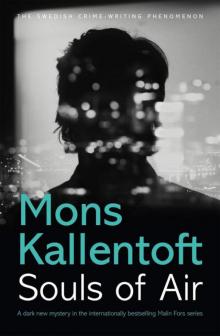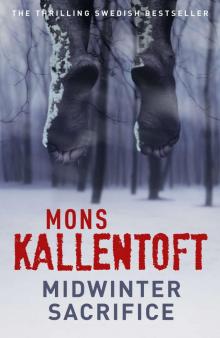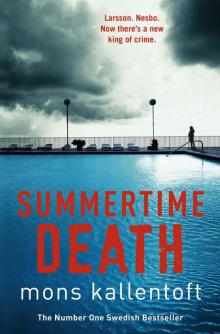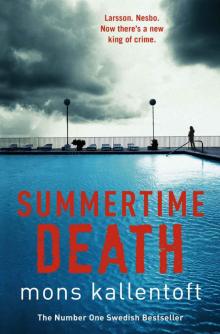- Home
- Mons Kallentoft
Zack Page 14
Zack Read online
Page 14
They stop at a red light by the entrance to the subway station at Fridhemsplan, its blue-and-white sign beckoning people into the subway, while the ice-cream kiosk next to the newsstand is doing brisk business.
People pass by as if it were a perfectly ordinary summer’s day, as if they lived in a world without evil, without any problems.
Zack feels like opening the window and telling them about Sukayana Prikon.
About the Thai women, if that’s what they were.
About all the women like them.
About all the victims of trafficking, hundreds of thousands of them.
What were you mixed up in, Sukayana Prikon?
He can see the fleshy stumps of her legs in front of him.
His private phone buzzes. He ignores it.
“Suppose Sukayana Prikon hasn’t been doing business with Recruitment Solutions Ltd, and that we’re not going to find anything in the accounts,” he says to Deniz. “If that’s the case, why would she have tried to lead us in that direction?”
“Because she wanted to put us on the wrong track?”
“But why? And would the Brotherhood have set dogs on her as revenge for that?”
“No, but what if she knows something else? Who the Brotherhood’s competitors are, for instance. Who they were expecting when they started shooting at us? Maybe she was trying to lead us in a specific direction.”
“Such as?”
“I don’t know. Toward other people who are involved, perhaps—people we don’t know about. The Brotherhood’s rivals.”
Zack’s phone buzzes again and again, and at the next red light he takes it out and starts reading.
Good tackle, mate.
Krille
Nice work, tough guy!
Christo
Didn’t know you fight girls
Adam
Zack doesn’t understand. Three text messages, apparently all about the same thing, from friends who don’t know each other. He wonders if someone’s filmed him in the gym, but when was the last time he sparred with a girl? It must be more than a year ago.
But some picture of him has evidently appeared somewhere, probably on Facebook or Instagram, or some other stupid social networking site.
Zack doesn’t have a Facebook account. He set one up when he was in high school, but after just two months he got sick of seeing his friends’ fuzzy drunken pictures and links to funny clips on YouTube. He closed the account when he left school, and has never opened another one.
He hasn’t signed up to any other sites either. He’s got a few fake accounts that he uses for work, and that’s enough to put him off.
His phone buzzes again. Abdula this time.
Have you seen that you’ve turned into click bait?
Abdula has attached a link. Zack clicks it and finds himself looking at an article on Aftonbladet’s website.
POLICE OFFICER KICKS WOMAN TO GROUND NEAR FAMILIES WITH YOUNG CHILDREN
Zack scrolls down and sees a blurred picture of himself tackling Sukayana.
Shit, he thinks. Shit.
“What is it?” Deniz asks.
Two cars blow their horns almost simultaneously. Zack looks up. Green light. He accelerates hard and Deniz practically yells at him to turn left instead of right into Fleminggatan.
“Why are we going this way?”
“I’ve got an appointment at St. Göran’s Hospital in quarter of an hour. The doctor wants to look at my neck.”
“Okay.”
“What were those texts about?”
“Some bastard took pictures of me when I was chasing Sukayana Prikon. And now it’s up on Aftonbladet’s website.”
“What? Let’s see,” Deniz says, leaning over to look at Zack’s phone.
He turns into the hospital precinct and pulls up by the pavement.
Zack clicks to bring up the whole article. It’s not just photographs, there’s a video clip as well. A shaky sequence filmed from a distance, but still close enough for viewers to see what’s going on.
Zack and Deniz read the text of the article:
It started as a pleasant family picnic. Then a policeman kicked an elderly woman to the ground—right on top of their food.
“It really was an extremely violent assault,” an eyewitness tells Aftonbladet.
One mother had to snatch her toddler out of the way of the policeman’s brutal attack in Tantolunden, on Södermalm in Stockholm.
“Everyone was screaming, it was chaos,” says Sandra Johansson, 37, who was sitting nearby during Monday’s dramatic events.
Other witnesses tell Aftonbladet that the fleeing woman looked terrified.
“That cop, he didn’t hold back at all. He just trampled everything in his path, he was really going for it,” says Joakim Pehrson, 22.
The plainclothes officer was eventually wrestled to the ground by several men, but when he showed them his police ID they let him carry on.
“A few minutes later he walked back through Tanto. By then he’d caught the woman and was holding her arm up behind her back. It looked like it was really painful,” says another witness.
The police are saying little about the event.
“We can’t comment on this story at present,” says Torbjörn Berg of the police’s public relations office.
Beneath the article there’s a question addressed to the paper’s readers:
Do the Swedish police use excessive force?
Seventy-three percent of readers have answered yes.
“What crap,” Deniz says. “Can’t they find out a few more facts before they publish this sort of stuff? That Sukayana Prikon threatened you with a knife, for instance, or that we’re actually trying to catch a killer with four lives on his conscience. Maybe that would make their hysterical witnesses calm down a bit. If they even exist. I bet the reporter made up those anonymous quotes.”
Zack drives up to the hospital entrance and drops Deniz off.
He sits there for a while and watches her disappear inside the building. Her body full of determination.
Where would I be without her? he thinks.
She watches out for me more than I realize.
Then he thinks about the video clip. He really didn’t enjoy seeing pictures of him kicking Sukayana Prikon to the ground.
Did he have to do it like that? No, he could have handled it much better. And he could certainly have made sure it all happened somewhere other than on someone’s picnic blanket.
He was slow and clumsy. Hungover, and suffering withdrawal symptoms. What happened was his fault, but Sukayana Prikon and the picnicking family were the ones who’d had to suffer for it.
Zack is just pulling away from the curb when Douglas calls.
“Have you seen the article?” he asks.
“Yes.”
“The press haven’t worked out that it’s you yet, but they’re calling pretty much every number in here to find out who it was. If they do get hold of you, just refer them to me. Tell them you can’t say anything at all because of the sensitivity of an ongoing investigation. Okay?”
“Okay,” Zack says.
In situations of this sort he likes his boss. Douglas always backs up his men and women when there’s trouble.
He tells Douglas about Sukayana Prikon and the hospital.
Douglas says nothing for a few moments, then says:
“We’re going to have to sit down and work out how much we’re going to make public. If we don’t say anything at all, Aftonbladet—and others too, no doubt—will go on spouting articles about police brutality. But if we go public about the link to the murder investigation, they’ll soon sniff out that it was Sukayana Prikon. And then all hell would break loose.”
“In that case I vote for option one,” Zack says, stopping at a pedestrian crossing.
“You haven’t experienced a media frenzy before, Zack. It can be really bloody awful, to be blunt. Don’t read what they print. And call me if you have any ideas.”
“Okay.”
“Did they say anything else at the hospital?”
Zack gives him a brief summary of what the doctor told him, and about the lack of witnesses. About the dog bites, and the Alsatian and Rottweiler crossbreed at the Brotherhood’s clubhouse.
“That was taken off to an animal shelter, so it couldn’t have harmed Sukayana Prikon,” Douglas says. “But that isn’t the only vicious dog they own. One of the Brotherhood’s members, Danny Johansson, owns a Staffordshire bull terrier and Alsatian cross. In 2011 he was fined after the dogs attacked an elderly woman and left her with severe bite wounds on one leg. He lives in a row house in Alby.”
“I’m on my way.”
“Not on your own. Come in first, and we’ll run through the various lines of inquiry.”
18
WITHOUT HIS leather vest Sonny Järvinen looks harmless. More like an accountant than a gang leader.
But Rudolf can’t see that. He listens instead. Builds up a picture of the man in front of him by registering his breathing and movements, the strength of his voice, and the changes in tone. After just five minutes he’s formed an idea of an intelligent man who moves far too easily and lightly to have big, pumped-up muscles.
Rudolf likes conducting interviews down in the holding cells. On “home territory.” Without a table between him and the suspect. It can foster a sense of intimacy that makes people open up.
And being underestimated is always on his side.
Sonny Järvinen is sitting in front of him, on a bunk fixed to the wall, with Rudolf’s old cassette recorder next to him, and for the third time in his life he’s dressed in the anonymous inmate’s uniform of Kronoberg Prison. He too is trying to form an impression of his opponent, a blind old man sitting on a wooden chair he brought with him, dressed in an old-fashioned suit. Almost comically harmless. But Sonny Järvinen realizes that the man’s exterior could just be camouflage, and that he needs to be on the alert.
Intelligence has nothing to do with the ability to see.
They’re talking about motorbikes. Rudolf used to own a Harley-Davidson, back in the day. A sky-blue 1959 Sportster.
“She was a real beauty,” he says, then adds: “I bought her secondhand over in the States in 1968. She carried me all the way across Arizona.”
Sonny Järvinen understands the old man’s tactic exactly. They get close to each other, feel a sense of camaraderie in spite of their different roles, then gradually Sonny starts saying more than he meant to.
He knows all that.
But it doesn’t help.
Soon he’s sitting and talking lyrically about his happiest motorbike trips to Norway and Italy, and they laugh loudly as they discuss their favorite scenes in Easy Rider.
“Fucking hell, Jack Nicholson and Dennis Hopper. What a team!” Sonny Järvinen says.
“Listen, Sonny,” Rudolf says. “I need your help.”
And Sonny Järvinen can’t help feeling that he’d really like to help Rudolf. He feels like dropping his guard and talking all about his life.
But his brain is resisting, telling him to get his act together.
He forces himself back to the blunt reality of the cell. Forces himself to see Rudolf in a different light.
He’s a cop. He wants me to talk.
But still he says:
“With what?”
“Four women have been murdered in an apartment. They were unarmed, helpless, and they were killed in a brutal and demeaning way. The man who killed them was a weak bastard,” Rudolf says. “And now a fifth woman has been mutilated. By dogs.”
He leaves a slight pause, letting the words sink in. Then he says:
“Sonny, we’ve got a pretty good idea of what you and your members are involved in, and we know you’d never sink so low as to shoot innocent women. But you do like dogs.”
“You’re absolutely right there,” Sonny Järvinen replies. “On both counts. But we’d never set the dogs loose on a woman.”
But on others, Rudolf thinks.
“That Danny Johansson in your gang. He’s got a couple of tough animals, hasn’t he?”
“Danny’s moved to South Africa,” Sonny Järvinen says. “He had the dogs put down first. That was the only solution, because he was the only person who could handle them.”
Rudolf rubs his brow.
“We think you know something about the killer,” he says. “Assuming that what you’re saying is true, and that you’re not behind all this. We’re also toying with the idea that it was him, or people close to him, that your friends on the roof were waiting for when my two colleagues showed up—leading to that unfortunate and unnecessary altercation.”
Sonny Järvinen sits there in silence, but Rudolf can hear him breathing more deeply. An emotional reaction.
“Some sort of aggravated conflict has flared up between you and another organization about control of the massage parlors, hasn’t it? And these murders are part of that conflict?”
“There are always idiots trying to cause trouble.”
Sonny Järvinen is surprised to hear the words emerge from his own mouth. He was going to keep quiet, after all. But it’s like the old man has got inside his head. As if it doesn’t make any difference if he keeps quiet, because the man can read his mind anyway.
“Are you thinking of anyone in particular in relation to this specific incident?” Rudolf asks amiably.
The moment has come. Sonny Järvinen needs to make his choice, a choice that he has been lying there worrying about all morning.
Either he keeps his mouth shut and keeps his honor intact. And dies. Like several members of the gang.
His brothers.
Or he talks. Lets the cops take care of the problem and gives himself a chance to save himself and his crew.
But he isn’t a snitch. And can any cop keep his word?
Maybe this old man can, despite everything. He’s so damn old that he might actually still believe in a gentleman’s agreement.
Sonny Järvinen looks at the bulky old tape recorder. A whirring old Panasonic with big buttons. It looks at least twenty years old. Solid. The sort of thing no one makes anymore. He guesses it’s easier for someone with impaired sight to handle rather than some slim-line Dictaphone with a touch screen.
He wants to gesture toward the tape recorder so that the old man realizes he has to turn it off, but how do you express that to a blind man?
Sonny Järvinen presses the stop button. The old man doesn’t react.
“If I give you a name, how can I trust that it won’t end up in the transcript of this interview, or be linked to me some other way?”
“I give you my word.”
“What’s that worth?”
“I’ve been conducting interviews with people for more than thirty years, everything from pickpockets to pedophiles and sadistic killers. People with considerably more power than you have sat opposite me and given me important information on the promise of anonymity. So far I’ve never broken my word.”
Sonny Järvinen looks at Rudolf. The old man is sitting there, perfectly calm. He finds himself wishing he’d had a grandfather like that when he was small.
“Their name is Yildizyeli,” he says. “They’re Turkish, fucking nasty bastards.”
“I’m going to be just as open with you, even though I risk looking stupid,” Rudolf says. “I’ve never heard of them.”
“They’re established here, but only just.”
“Where can we find them?”
Sonny Järvinen doesn’t answer at first. He’s thinking about what he’d have done to any club member who’d given the police similar information.
It would have been very bloody.
Then we’d have stood in a circle and pissed on his undershirt.
“Okay,” Sonny Järvinen says, and leans forward. “I’ll tell you.”
19
ZACK BARELY manages to open the door of the Special Crimes Unit before Douglas comes up to him.
“Sonny Järvinen has given
us a name.”
“What?” Zack says.
“That was my reaction as well, but it’s true. The name’s Ösgür Thrakya, and according to Järvinen he belongs to a Turkish gang.”
“What? Are the Turks involved in this?”
“Maybe. I’ve just spoken to the prostitution unit. There’s evidently talk among the women out on the street that the Turks have started to show up in the city. Rumor has it that they’re trying to establish some sort of business involving Asian girls. It’s all very vague, nothing concrete at all. But Järvinen described the Turks as the maddest of the mad.”
Zack thinks back to the shootout at the Brotherhood of No Mercy’s clubhouse.
Were they waiting for a gang of Turkish crooks to show up?
Are they competing for the prostitution market?
“Do we know anything else about them?”
“Very little. Sirpa’s busy pulling together what we’ve got.”
Sirpa looks up as they approach her desk.
“He seems like a really nice guy, this Thrakya,” she says. “As far as his background goes, he used to be head of intelligence for some sort of Turkish militia, and there are persistent rumors that he used to boil people alive.”
“That has to be made up. That sort of thing went out with the Middle Ages,” Zack says.
“I’m sorry to say it still goes on. Ask people in prison in Uzbekistan. According to Amnesty, there are documented cases of prisoners being boiled alive just a few years ago,” Sirpa says.
“So what else do we know about this Ösgür Thrakya?” Douglas asks.
“I’ll read it out to you,” Sirpa says. “He was born in 1961 in the village of Yaliköy, on the Black Sea coast in northwestern Turkey. Interpol have been looking for him since 2007, for human trafficking offenses, as well as large-scale weapons smuggling.”
She scrolls down the screen.
“Today he’s said to be second in command of the criminal organization Yildizyeli, which apparently means ‘north wind’ in Turkish. The group is believed to have several operational bases abroad, including in Germany, Britain, and in the border regions of Thailand, Laos, and Burma, the area known as the Golden Triangle. But they have no known involvement in Sweden.”

 Souls of Air (Malin Fors 7)
Souls of Air (Malin Fors 7) Autumn Killing dimf-3
Autumn Killing dimf-3 Midwinter Sacrifice
Midwinter Sacrifice Earth Storm_The new novel from the Swedish crime-writing phenomenon_Malin Fors
Earth Storm_The new novel from the Swedish crime-writing phenomenon_Malin Fors Zack
Zack Summertime Death
Summertime Death Summertime Death mf-2
Summertime Death mf-2